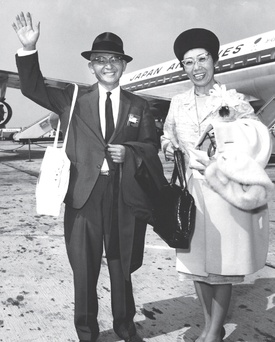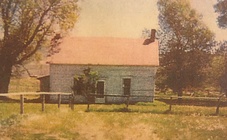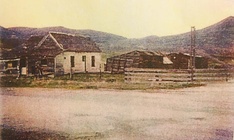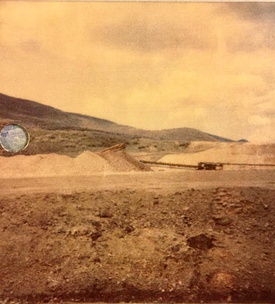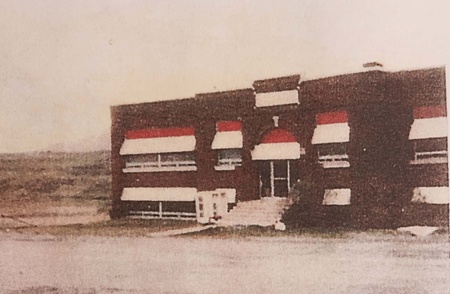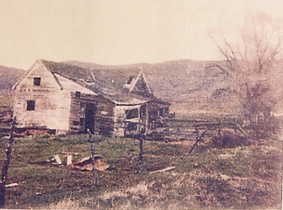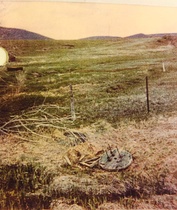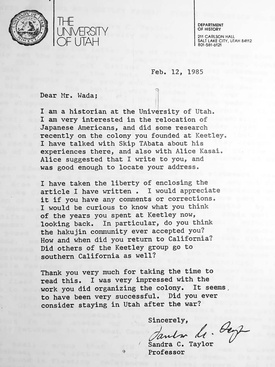Read Part 1 >>
Do you remember if there was any convincing that Mr. Wada needed to do with your family?
No, that I have no idea. I just imagine what happened was he says, “Take me, too.”
To get back to the history, they were allowed to voluntarily leave California. And I think there something like 10,000 permits given out. Out of that 10,000 only few made it. Not many. Some of what I read is that they were turned away at the border. Some others put in for a permit with the intention of leaving but changed their minds. Because where you going to go?
Unless you have a family or friend who was willing to take you who lived in the Midwest somewhere. Just to go out there blind, is, no. And also as far as travel is concerned, mobility was limited. Then, it was two-lane road. And it was an arduous trip. Very few gas stations, very few motels, and so forth. So, your mobility was pretty well limited for a lot of people.
So the Wadas did a semi-caravan. They had a few trucks to carry some furniture, not a lot. I think each family was allowed to pick one or two. Because they only had about four trucks or something like that. And whatever you could take in your car. The rest you had to sell or whatever or store. So we did travel and as I remember, we never stayed at a motel. My mother was very apprehensive about going in and asking for a room. So on the trip there, I remember we slept in the car to Utah. And I remember she was very apprehensive about going into restaurants.
Because of the feeling against Japanese?
Yeah, being stared at. Well she was almost paranoid. [laughs] When we did stop at a rest stop, we’d order a bunch of sandwiches to carry us through so she doesn’t have to go to any other restaurants. But it was hard, it was hard on the parents. Was it hard on me? I don’t know, I don’t remember that much, the hardship. But the parents, my god. Could I do it? No. I couldn’t do it. I can’t imagine myself doing it.
I remember going to Keetley and it was really snowing, it was just covered in snow. I went back right after I got married and took some pictures.
Wow. So is it designated as a site, like a historical site?
You know what it is? It’s under water. It’s a reservoir.
All of this is now?
It’s all under water. They made a lake. It’s a valley, it’s a depression and they flooded it. I don’t know if they made a dam for power or what. But it’s a lake.
When did that happen?
That happened, oh gosh, had to be twenty years ago. But anyway, yeah it’s funny how I remember this store. There’s one picture, where we lived. It was a big building and they turned that into a motel after we left. And I remember the guys who were up on top of the roof, it was a flat roof, and throwing blocks of ice because it just built up. When we drove in, we had people, like an advance party that was there. And then we were all assigned to these rooms, really. We lived in there.
So where the families stayed were in this makeshift hotel?
Or if it was a big family, they went to some of these homes. We were spread out, in the valley. Myself, we were in this motel and right next to the motel was a little house, little shed. And I remember later on, after a year we moved into the little shed. Individual house, I wouldn’t even call it a house. I don’t think it was bigger than that, the living room. And when we went back, they stored snow equipment in there. I says, “Hey, this is where I lived!”
Initially whatever homes were there, were abandoned at the time, it was empty. And what it was used for early was to house miners. I think it was a silver mine there. It’s only a few miles from Park City.
You know what’s interesting is that I don’t know about now but when the museum [the Japanese American National Museum] first opened in L.A., and I mentioned it. “Do you have anything on Keetley?” They didn’t know. I told them about it and if they’ve done anything about it, or added research on it. I don’t know. I think their main interests were camp. I don’t know what they [the community] consider us, those who left California. I mean, is there a negative? I don’t know.
I don’t think so. First of all no one knows about it, so no one has an opinion about it. I think they’d see Wada as a visionary leader, maybe?
Howard didn’t sound too convinced that that would be the case.
Yeah. After the war, in L.A., he got into city government. He was a port commissioner for L.A. He was very prominent with those that were in power.
But anyway to get back to Keetley, when they got there, the snow melted and they were shocked. It was all rocks. So what they did is clear the rocks by hand, so to speak. They didn’t use the whole 3,000 acres. It was just a small parcel of that land and they farmed it. What I never asked or talked about was, how did they split the money that they earned?
From selling the produce?
Yeah, I never knew. He [Fred Wada] was a super patriot. Well, he wanted to be seen as super patriot for the U.S. I think I think there was a billboard sign saying something to the fact of, “Farm for America.” So in that sense I think the Japanese, there anyway, were into [feeling patriotic].
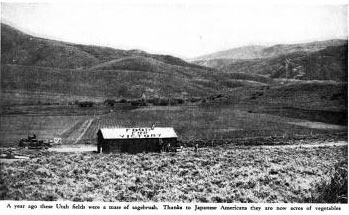
Here they are working for America and all that. So the negativism slowly dissipated. Are there a bunch of things that they ran into? You know, anti-Japanese? I’m sure. But being typical Japanese, they don’t talk about it.
My father mentioned a couple of times. See, he couldn’t work on the farm, he’d break out in rash or whatever. But he took a job on a railroad after Wada no longer needed his services there at Keetley. We still lived there but I remember him taking a job, I don’t know if it was with the railroad and he was turned away a lot. He mentioned a couple of times, a lot of discriminatory remarks made against him. But, he was just typical Japanese, he’d just laugh about it, you know.
It was quite an experience, it was quite an experience. My first songs that I learned was “Jesus Loves Me,” and that was by the Mormon missionaries who came to our settlement in Keetley.
In Salt Lake, I went to the elementary school, I think first and second grade. And to get on the good side with the teachers my mother used to give me things she got from camp to give to the teacher. Topaz at one point was under water in the past. So they would make these little pendants with seashells. Beautiful. And well, they had nothing else to do. So they would make these and I don’t think they even sold them they just, made them. Some of my mother and father’s friends would give it to them as a gift and then she in turn would say, “Hey, Habo, take this to the teacher and give it to the teacher.” Oh and they were delighted. Also another thing, they would carve birds.
Oh, wood?
Out of wood. Beautiful and it’s a pendant. And I remember opening up my mother’s drawer right after we moved here. Full of them. What happened to them? I don’t know. What few there are left are in the Japanese American National Museum. I remember giving it to the teacher and they were so delighted.
And your dad knew the ultimate goal was to come back to California?
Oh yeah, that was his ultimate goal. Slowly after the war people started moving out. And that in itself was traumatic. A lot of them came back to their home and it was pretty trashed, you know. A lot of furniture and things that they had their neighbors hold onto were gone. Automobiles sold and everything.
When we left Salt Lake, we moved to Stockton. And my dad opened up a Japanese restaurant there. As far as my parents getting back on their feet, it was easier because they had a restaurant, my father was a cook. And owning a fairly successful restaurant although it was small, was lucrative, I think for them. But it was at a time when everyone started filtering back into California. We lived right in the so-called J-town of Stockton and our restaurant was a block away from the Buddhist church. Our sleeping quarters were in the basement of the restaurant. And we had no shower. So I remember we paid a dime or nickel to take a shower at the Buddhist church. They had a building there, it was like a hostel. So we could take a shower there.
But what was vivid is they had a basketball gymnasium, which was part of the Buddhist church. And people who were returning from the camp, all lived in the gym. So all you had is blankets I remember, separating the families until they could find a permanent home.That is really vivid.
Do you remember anything when you came back to California and you started to go to school?
Did I face any discriminatory experience? Not that I know of. If I did, I didn’t know what was going on. Elementary school, junior high, it was mixed, beautiful. High school, you start pulling away. I don’t know if your dad ever talked about it but in the cafeteria, you had your little Japantown. All the Japanese sitting at this particular corner and eat. All the African Americans and Mexicans, you know. The white students, they had a fraternity type of thing, clubs. Of course we were excluded and we knew that. So we pretty much stuck to ourselves. Except for the guys as far as sports is concerned. So they’d mix there, but socially not much. Now you go to dances, right, you rarely see, I don’t think I’ve ever seen, a Japanese dance with a white girl. I don’t think I’ve ever. One, they would look at the girl, as, “Who is she?” And the Japanese would look at the guy, say, “Who does he think he is?”
After an aside about memories of high school, we turn the conversation back to Fred Wada.
When did Mr. Wada pass away?
Had to have been 14 years ago maybe, 15 years ago? I went to see him. They moved him down into the dining room. They made a bed in there. I think he was dying of cancer. And he’s laying in bed. I took my son down with me to visit him. He says, “Dad I can’t believe it.” I says, what? “He has an ashtray on his chest.” He was a chainsmoker and even at that time he was just smoking away and hey, at that point, why not? And anyway he said, “Hey, Habo! You come to see a dying man, huh?” I was like ah stop, c’mon Mr. Wada.
But I have utmost respect for him, for what he did. Could I have gotten along with him? I don’t know. I didn’t know him that well.
So you think you stayed as close as you were because of your dad’s friendship with him?
Yep. It was my dad’s friendship. Really.
*This article was originally published on Tessaku on September 30, 2016.
© 2016 Emiko Tsuchida


